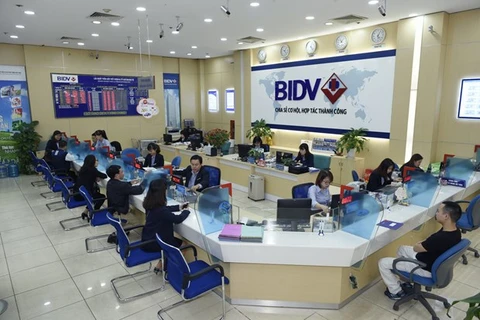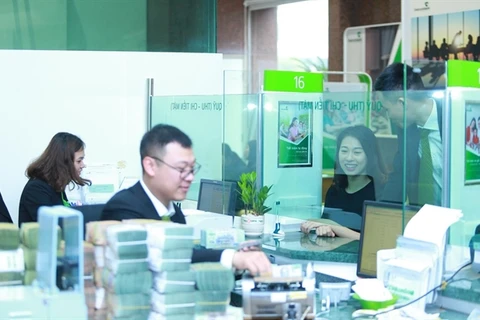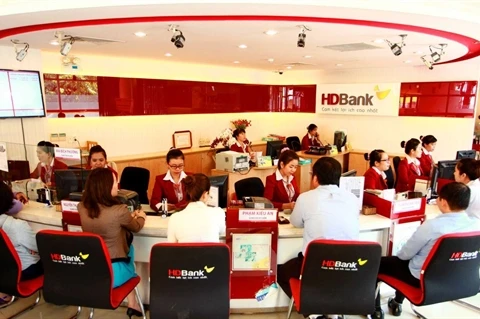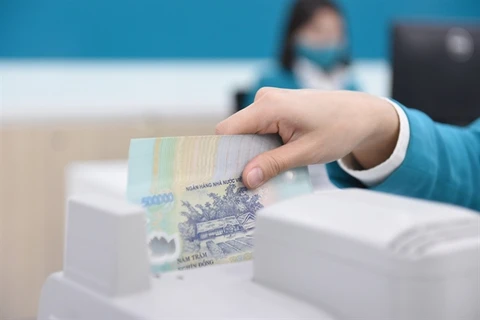Hanoi (VNS/VNA) - Vietnam’s four biggest State-owned banks have an urgent need for capital increase in 2023 as their charter capital is too low, with some unable to ensure the regulated minimum capital adequacy ratio (CAR), according to industry insiders.
Currently, the big four, including BIDV, Vietcombank, Agribank and VietinBank, only hold more than 40% of the credit market share of the country’s banking system, but over the years, especially in the past three years, the banks have been a key force in supporting the economy to overcome the difficulties caused by the COVID-19 pandemic and global economic uncertainties.
State-owned banks always take the lead in implementing incentive policies of the National Assembly, the Government and the State Bank of Vietnam (SBV) such as lowering interest rates and profits to support businesses, but they themselves are facing difficulties in terms of capital.
According to Agribank’s Chairman Pham Duc An, at the current credit scale, Agribank is unable to ensure the minimum CAR to get higher credit growth due to the low charter capital, which caused the bank to have a low credit growth in 2022 compared to the average rate of the banking system.
Increasing charter capital for Agribank is very urgent as only when the minimum CAR is ensured for developing credit right from the beginning of 2023, Agribank has the resources to serve the capital needs of the economy, especially in rural areas, An noted, suggesting that the Government should advance 6.75 trillion VND of charter capital for Agribank as an estimated plan approved by the National Assembly.
Nguyen Quoc Hung, General Secretary of the Vietnam Banks Association, also proposed the Government submit to the National Assembly to increase Agribank’s charter capital in order to meet the regulated CAR. As Agribank’s CAR is close to the allowed limit, the bank’s capital mobilisation and lending will be both restricted without a charter capital hike.
Despite having a proactive advantage over Agribank, the three remaining State-owned banks still have to wait for the Government’s approval in order to raise capital as expected. There are many potential risks for the three banks as their CAR is currently just slightly above the regulated minimum. Therefore, BIDV’s Chairman Phan Duc Tu requested the Government, the Ministry of Finance and the SBV continue allowing State-owned banks to use their after-tax profits after deducting funds in 2022 to increase charter capital in a move to enhance their financial resources and ensure the CAR.
For Vietcombank, though the bank has taken many measures to increase charter capital, its CAR is still very modest compared to its development needs as well as international standards. The bank’s chairman Pham Quang Dung proposed the Government and the SBV continue to give priority to the charter capital increase of State-owned banks.
Vietcombank is looking forward to soon being approved by the Prime Minister to increase its charter capital from the retained profits in 2019 and 2020 after deducting funds, which has been agreed by the SBV and the Ministry of Finance to submit to the Prime Minister. In 2023, Vietcombank plans to ask the SBV to submit to the bank’s general meeting of shareholders to further increase its charter capital from all the remaining accumulated profits in 2021 and the previous years.
As the Prime Minister, the SBV and the Ministry of Finance have so far agreed on the proposal in principle, Vietcombank expects to receive support from the Government, the SBV and relevant ministries in the process of reporting, explaining and applying for approval of the proposal from the National Assembly, Vietcombank’s Chairman Pham Quang Dung said.
According to statistics, as of October 2022, the CAR of the State-owned banks was only 9.04%, much lower than that of other regional countries, such as the Philippines (16.29%), Singapore (17.2%), Malaysia (18.3%), Thailand (19.3%) and Indonesia (23.3%). Moreover, many countries in the region have so far applied Basel III, or a part of Basel III, while banks in Vietnam have mostly implemented Basel II. The low CAR will affect the credit supply of the State-owned banks, which will limit their support to businesses, especially when the economy is facing many potential risks. Notably, if the shortcoming is prolonged, it will be difficult for State-owned banks to maintain their dominant positions in the banking system.
A member of the National Financial and Monetary Policy Advisory Council also said it is necessary to increase charter capital for State-owned banks as sustainable banks will give the best support to the economy. For Agribank, the priority of increasing capital is even more important because the bank mainly serves rural areas, which are key for the economy.
If Agribank is allowed to increase capital, it will provide a large amount of cheap capital to the economy, helping millions of customers develop their businesses. When customers perform well, banks do business effectively, there will be good tax payments to the State.
A banking expert even said if considering the State budget as an investment, investing in State-owned banks will get the best return as they have been steadily profitable and annually contributed trillions of Vietnamese dong in tax to the State budget./.
Currently, the big four, including BIDV, Vietcombank, Agribank and VietinBank, only hold more than 40% of the credit market share of the country’s banking system, but over the years, especially in the past three years, the banks have been a key force in supporting the economy to overcome the difficulties caused by the COVID-19 pandemic and global economic uncertainties.
State-owned banks always take the lead in implementing incentive policies of the National Assembly, the Government and the State Bank of Vietnam (SBV) such as lowering interest rates and profits to support businesses, but they themselves are facing difficulties in terms of capital.
According to Agribank’s Chairman Pham Duc An, at the current credit scale, Agribank is unable to ensure the minimum CAR to get higher credit growth due to the low charter capital, which caused the bank to have a low credit growth in 2022 compared to the average rate of the banking system.
Increasing charter capital for Agribank is very urgent as only when the minimum CAR is ensured for developing credit right from the beginning of 2023, Agribank has the resources to serve the capital needs of the economy, especially in rural areas, An noted, suggesting that the Government should advance 6.75 trillion VND of charter capital for Agribank as an estimated plan approved by the National Assembly.
Nguyen Quoc Hung, General Secretary of the Vietnam Banks Association, also proposed the Government submit to the National Assembly to increase Agribank’s charter capital in order to meet the regulated CAR. As Agribank’s CAR is close to the allowed limit, the bank’s capital mobilisation and lending will be both restricted without a charter capital hike.
Despite having a proactive advantage over Agribank, the three remaining State-owned banks still have to wait for the Government’s approval in order to raise capital as expected. There are many potential risks for the three banks as their CAR is currently just slightly above the regulated minimum. Therefore, BIDV’s Chairman Phan Duc Tu requested the Government, the Ministry of Finance and the SBV continue allowing State-owned banks to use their after-tax profits after deducting funds in 2022 to increase charter capital in a move to enhance their financial resources and ensure the CAR.
For Vietcombank, though the bank has taken many measures to increase charter capital, its CAR is still very modest compared to its development needs as well as international standards. The bank’s chairman Pham Quang Dung proposed the Government and the SBV continue to give priority to the charter capital increase of State-owned banks.
Vietcombank is looking forward to soon being approved by the Prime Minister to increase its charter capital from the retained profits in 2019 and 2020 after deducting funds, which has been agreed by the SBV and the Ministry of Finance to submit to the Prime Minister. In 2023, Vietcombank plans to ask the SBV to submit to the bank’s general meeting of shareholders to further increase its charter capital from all the remaining accumulated profits in 2021 and the previous years.
As the Prime Minister, the SBV and the Ministry of Finance have so far agreed on the proposal in principle, Vietcombank expects to receive support from the Government, the SBV and relevant ministries in the process of reporting, explaining and applying for approval of the proposal from the National Assembly, Vietcombank’s Chairman Pham Quang Dung said.
According to statistics, as of October 2022, the CAR of the State-owned banks was only 9.04%, much lower than that of other regional countries, such as the Philippines (16.29%), Singapore (17.2%), Malaysia (18.3%), Thailand (19.3%) and Indonesia (23.3%). Moreover, many countries in the region have so far applied Basel III, or a part of Basel III, while banks in Vietnam have mostly implemented Basel II. The low CAR will affect the credit supply of the State-owned banks, which will limit their support to businesses, especially when the economy is facing many potential risks. Notably, if the shortcoming is prolonged, it will be difficult for State-owned banks to maintain their dominant positions in the banking system.
A member of the National Financial and Monetary Policy Advisory Council also said it is necessary to increase charter capital for State-owned banks as sustainable banks will give the best support to the economy. For Agribank, the priority of increasing capital is even more important because the bank mainly serves rural areas, which are key for the economy.
If Agribank is allowed to increase capital, it will provide a large amount of cheap capital to the economy, helping millions of customers develop their businesses. When customers perform well, banks do business effectively, there will be good tax payments to the State.
A banking expert even said if considering the State budget as an investment, investing in State-owned banks will get the best return as they have been steadily profitable and annually contributed trillions of Vietnamese dong in tax to the State budget./.
VNA
























